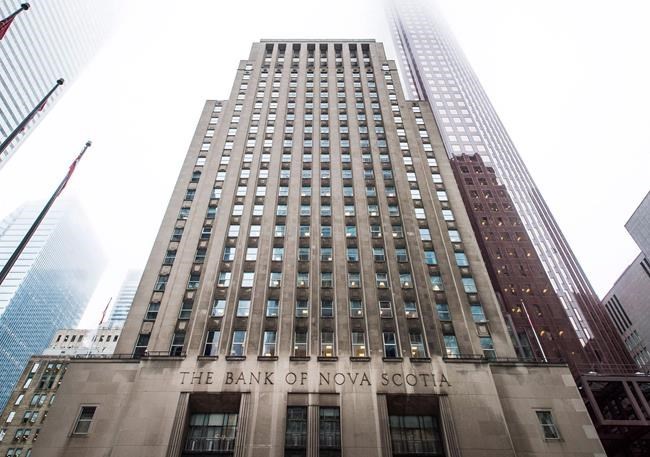TORONTO — COVID-19 weighed down Bank of Nova Scotia's second quarter, causing its profit to plunge and the company to increase its reserves to cover bad loans.
The Toronto-based bank reported Tuesday a profit of $1.32 billion for the period ended April 30, down sharply from a year ago.
The bank's provisions for credit losses totalled nearly $1.85 billion for the quarter, more than doubling from $873 million a year earlier.
"This is not a garden-variety recession...We've never been through this before," Scotiabank chief executive Brian Porter told analysts on a call on Tuesday morning.
"We're cautious here. This is not a one-quarter or two-quarter event. The banking sector will be picking up broken egg shells for a number of quarters here."
Porter acknowledged that Scotiabank's results were significantly impacted by COVID-19, but reminded listeners that the bank and all its operating divisions continue to be profitable.
He said the bank is well-positioned from a capital and liquidity perspective and appropriately reserved for credit losses.
Scotiabank's profit for the quarter amounted to $1.00 per diluted share compared with a profit of nearly $2.26 billion or $1.73 per diluted share in the same quarter last year.
On an adjusted basis, it earned $1.04 per diluted share in the quarter compared with $1.70 per diluted share a year ago.
Analysts on average had expected Scotiabank to earn an adjusted profit of 98 cents per share for the quarter, according to financial markets data firm Refinitiv.
The bank spent much of the quarter focused on offering loan and mortgage deferrals to customers struggling with the impacts of COVID-19 and its impact on the economy.
"I have often said the role of banking is to act as a shock absorber during times of crisis. That was true in previous times of difficulty and it is certainly true today," Porter said.
Scotiabank offered about $100 billion in total loan support, which included financial relief for more than 300,000 customers in Canada on loans totalling over $40 billion.
In the Pacific Alliance, the bank processed more than two million customer service applications on loans totalling $20 billion and to support small businesses and corporate clients, it provided additional loans over $45 billion.
Demand for deferrals is starting to taper off, after peaking in Canada in the first week of April, Porter said.
Meanwhile, the bank is seeing strong growth in its digital subsidiary Tangerine and online discount brokerage iTrade.
Gabriel Dechaine, an analyst at National Bank Financial, said in a note to investors that the bank's performance was in line with his expectations, but he is keeping an eye on how the ratio of its loan book to payment deferrals compares to other banks.
"Longer term, we do not believe BNS or any other bank will rally on a sustained basis until there is light at the end of the credit cycle tunnel," he said, referring to the bank by its stock symbol.
Barclays analyst John Aiken, who had expected COVID-19's impact on banks to be "ugly," said Scotiabank's earnings were better than expected because credit was better than expected.
He suspected that the results will likely be rewarded, but warned that these are still the early stages of credit development.
"It is our view that ongoing heightened provisions are more likely in coming quarters," he said.
"Expectations will likely be that additional reserves will need to be taken in future quarters as the true impact of the pandemic will be felt."
This report by The Canadian Press was first published May 26, 2020.
Companies in this story: (TSX:BNS)
Tara Deschamps, The Canadian Press




